 Brave Chan Yung (1st left), Hong Kong deputy to the National People’s Congress, Lau Siu-kai (2nd left), professor emeritus of sociology at the Chinese University of Hong Kong and vice-president of the Chinese Association of Hong Kong and Macao Studies, and Elsie Leung Oi-sie (2nd right), Hong Kong's former secretary for justice and former deputy director of the Hong Kong Basic Law Committee of the NPC Standing Committee, join a panel discussion moderated by Wang Songmiao (1st right), secretary-general of the Liaison Office of the Central People’s Government in the HKSAR, during a seminar on the relationship between the Communist Party of China and the “one country, two systems” principle at the Hong Kong Convention and Exhibition Centre on June 12, 2021. (EDMOND TANG / CHINA DAILY)
Brave Chan Yung (1st left), Hong Kong deputy to the National People’s Congress, Lau Siu-kai (2nd left), professor emeritus of sociology at the Chinese University of Hong Kong and vice-president of the Chinese Association of Hong Kong and Macao Studies, and Elsie Leung Oi-sie (2nd right), Hong Kong's former secretary for justice and former deputy director of the Hong Kong Basic Law Committee of the NPC Standing Committee, join a panel discussion moderated by Wang Songmiao (1st right), secretary-general of the Liaison Office of the Central People’s Government in the HKSAR, during a seminar on the relationship between the Communist Party of China and the “one country, two systems” principle at the Hong Kong Convention and Exhibition Centre on June 12, 2021. (EDMOND TANG / CHINA DAILY)
HONG KONG - Hong Kong heavyweights from various sectors on Saturday hailed the “one country, two systems” principle that has ensured the long-term prosperity of the city after its return to its motherland in 1997.
They made the remarks during a high-level seminar featuring the relationship of the Communist Party of China and "one country, two systems" in Hong Kong.
Elsie Leung Oi-sie, Hong Kong's former secretary for Justice, said during a panel discussion that the "one country, two systems" principle fully conformed to the actual situation in Hong Kong, as it not only safeguards the national sovereignty but also ensures the long-term prosperity of the city after its return in 1997.
ALSO READ: Luo: 'One country, two systems' huge contribution to mankind
Lau Siu-kai, vice-president of the Chinese Association of Hong Kong and Macao Studies, said the vitality of "one country, two systems" lies in its forward-looking and self-correcting mechanism. Under the principle, the central government exercises overall jurisdiction over Hong Kong, which enjoys a high degree of autonomy. That makes it possible for Hong Kong to return to the right track without a complete overhaul of the institutional setting, he added, citing the positive outcomes that the National Security Law for Hong Kong and the electoral reform have brought to the city.
Brave Chan Yung, a Hong Kong deputy to the National People's Congress, said the nation's prosperity serves as the strongest backing for the implementation of "one country, two systems"
Brave Chan Yung, a Hong Kong deputy to the National People's Congress, said the nation's prosperity serves as the strongest backing for the implementation of "one country, two systems". With the central government's full support, Hong Kong has the greatest confidence to give full play to its strengths, he said.
Tam Yiu-chung, Hong Kong deputy to the National People's Congress Standing Committee, told China Daily after attending the event that the Party has offered unswerving support for the city to overcome various difficulties. Tam said these activities held to mark the Party's centenary has enabled Hong Kong people to better understand what the Party has done for the city, which is quite meaningful.
ALSO READ: Original intention key to 'one country, two systems'
Lawmaker Vincent Cheng Wing-shun said previously Hong Kong people did not have enough understanding of the country and the ruling Party. With the implementation of the National Security Law for the city and the further integration in the Guangdong-Hong Kong-Macao Greater Bay Area, he believes they will have a deeper experience of the Party's leadership over Hong Kong and its significance to the city.
In a phone interview, Executive Councilor Ronny Tong Ka-wah said China resumed the exercise of sovereignty over Hong Kong under the leadership of the Communist Party of China.
For the long-term success of “one country two systems”, he called on the city to wholeheartedly integrate into the country’s development. “We must integrate into the constitutional order that governs the very existence of Hong Kong,” Tong said.


